OFweek Medical Technology Network News On November 14, 2017, the two-day "OFweek 2017 (2nd) China Medical Technology Conference" hosted by OFweek China High-Tech Industry Portal and the High-Tech Association was successfully held by OFweek Medical Technology Network. The atmosphere at the conference was extremely active. Hundreds of people from the industry gathered together to actively interact with industry experts and business representatives to discuss the development hotspots and difficult issues in the medical technology field.
In the "OFweek 2017 China High-Tech Industry Conference (CHIC2017)" on the morning of November 13, IEEE Academician, Academician of the International Academy of Navigation and Motion Control, and Academician of the New York Academy of Sciences, Cai Zixing, first made a speech, which led to the development of artificial intelligence. Subsequently, Zhang Yuanting, an academician of the International Academy of Medical and Biological Engineering , and Zhang Jianwei, a professor at the University of Hamburg in Germany and a member of the Hamburg Academy of Sciences in Germany , gave a detailed introduction to the future development of medical technology in the field of artificial intelligence. On the afternoon of November 13th, "OFweek 2017 (2nd) China Medical Technology Conference" in the Health and Medical Big Data Session, Professor Wu Jianhua from the University of Chinese Academy of Sciences, Professor Guan Yi from Harbin Institute of Technology, and Jiang Guowen, Minister of Cloud Environment Solutions, Huawei According to seeing the chairman of the medical board Chen Hao, the medical staff of the peptide building blocks, and the president of the Kingdee Medical Innovation Institute, Yi Yanhua, we shared the development direction and future challenges of the health care big data field.
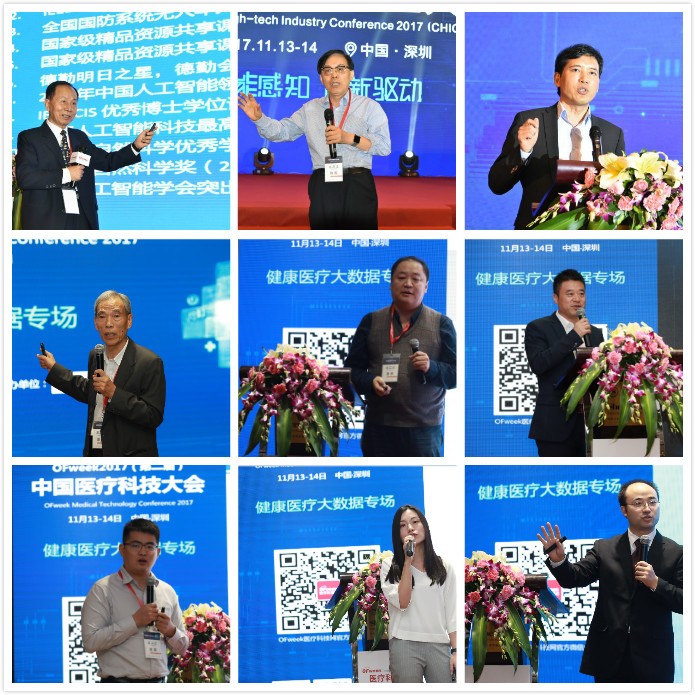
13th speaker (partial)
In the precision medical special on the morning of November 14, Sun Dong, an IEEE academician and a professor at the City University of Hong Kong, first made a speech on the development of robots in the future medical field. Subsequently, Academician Sun Dong introduced the concept of cellular robots through the process of tumor development in the special lecture “Using Robotics to Realize Accurate Cell Surgery†and proposed the challenges faced by cell robots. Regarding the development and current status of cellular robots, Academician Sun Dong said: "Cell robots have undergone major changes at the organ-to-cell level by repairing and integrating single cells, then amplifying millions of orders of magnitude and transmitting them to the designated cells. In the subsequent speech, Academician Sun Dong said that the lack of precision, low efficiency and low success rate of cell robot operation has become an urgent problem to be solved. For the future operator form, Academician Sun Dong detailedly said: "The future operators will be the following three. One, the laser operator, mainly through the robot to control the light particles to track single cells in the body; Second, mechanical operation The device, such as the probe operation, has high precision requirements, cannot be realized manually, and can only be completed by machine operation. Third, the electromagnetic operator mainly controls the robot through electromagnetic force to complete the operation." During the speech, Sun Dong Academicians through the detailed case study of liver cancer treatment, proposed advanced technologies such as the optical operating system and accurate quantitative robotic microinjection system, and concluded at the end: "The cell surgery robot represents the development frontier of medical robots, and its future application will be extremely Promote the development of precision medicine and regenerative medicine to a large extent."
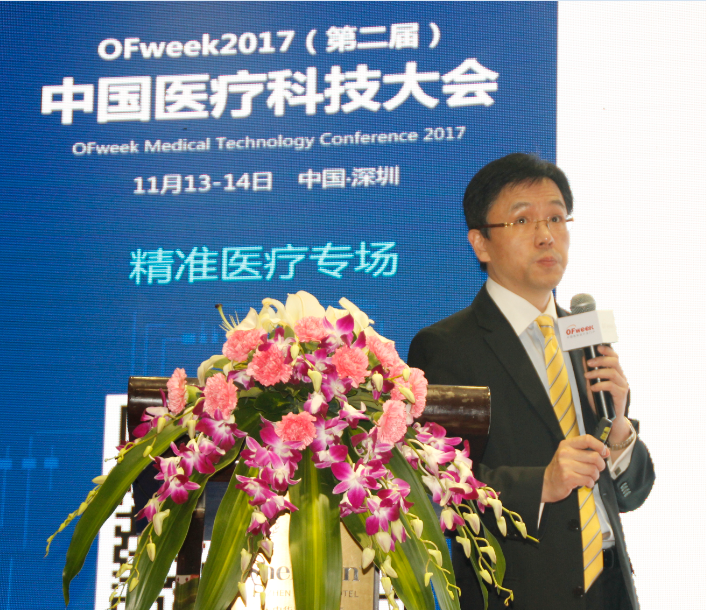
IEEE Fellow, Professor of Dongcheng City University, Sun Dong
Subsequently, Hu Qingxi, director and professor of the Rapid Manufacturing Engineering Center of Shanghai University, introduced the topic of “3D printing in the field of bio-precise medical treatment†through the background of the concept of precision medical concept, and took the development of 3D printing technology in the field of orthopedics as an example. The description of the progress of 3D printing in the field of precision medicine. Judging from the market development of 3D printing technology in the medical field, the market for human tissue and organs is in short supply, which has become a major factor in its rapid development. So what is the current state of research in 3D printing in the field of precision medicine? In this regard, Professor Hu Qingxi introduced: "3D printing preparation of biological stents is currently a technology applied in the medical field, it belongs to macro technology. And electrospinning technology belongs to micro technology, both have advantages and disadvantages, and how Better combination is the subject we are studying now.†Finally, Professor Hu Qingxi said that 3D printing technology will become the most effective means for tissue and organ repair in the field of bio-precision, and it is also the future development direction of bio-precision. .
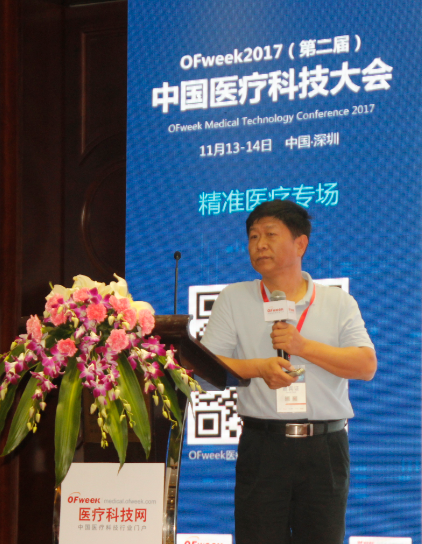
Hu Qingxi, Director and Professor of Shanghai University Rapid Manufacturing Engineering Center
Next, Keysight nano-applications expert Zhao Jing took the topic of “Biomedical Material Testing Challenge†and introduced biomedicine in detail through atomic force microscopy, nanoindentation, nano-stretching instrument and table field emission scanning electron microscope. Testing applications of materials in the field of precision medicine. In the speech, Zhao Jing shared the application process of biomedical materials with examples of living cell image, tooth nanoindentation test, monofilament fiber stress-strain curve and bacterial scanning electron microscope image. He believes that the application of biomedical materials is more and more extensive, and we will continue to develop more products in the future to meet the challenges of precision medicine.
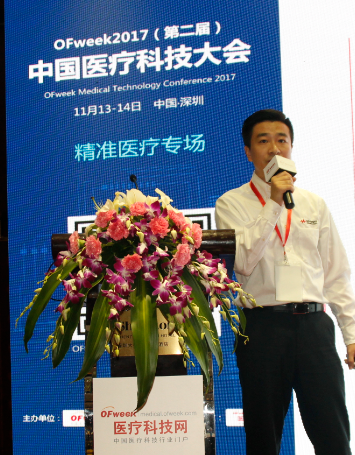
Keysight nano product application expert Zhao Jing
Next, in the keynote speech “Breaking the Biomarker Research and Personalized Drug Guidance for Cardiovascular Disease Accurate Medical Treatmentâ€, Li Guanglei, Assistant Executive Dean of the Institute of Precision Soil Medicine, South University of Science and Technology, mainly discussed cardiovascular disease as an example. Research results such as incentives, precision testing, and personalized medication guidance. For the challenges faced by cardiovascular treatment, Dean Li Guanglei said that the current cardiovascular disease treatment mainly faces two major challenges. First, the incidence of cardiovascular disease is faster and the treatment is too late. Second, cardiovascular patients are dependent on drugs. High, affecting the quality of life.
Subsequently, Dean Li Guanglei made a brief summary of the causes and medications of cardiovascular disease. She said: "The causes of cardiovascular disease are divided into external factors and internal factors. The external causes are mainly caused by factors such as living habits, environment and diet. It is a genetic factor. Because each person's genetic and environmental factors are different, their response to drugs is different, so we can choose the medicine that suits you best through a simple evaluation test, so as to solve the most effective problem. disease."
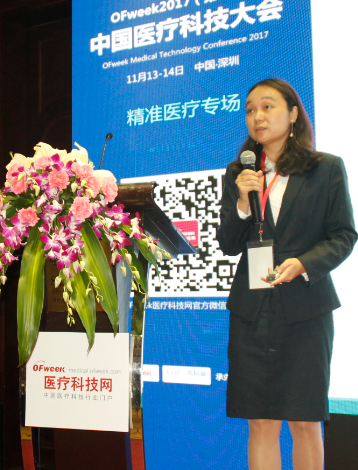
Li Guanglei, Assistant Executive Dean, Institute of Precision Soil Medicine, South University of Science and Technology
Finally, Zhang Yi, the director and professor of the First Affiliated Hospital of Zhengzhou University, gave a wonderful speech on the theme of “Accurate Tumor Immunotherapyâ€. At the beginning of his speech, he gave a brief introduction to the clinical progress of PD1, CAR-T and TCR-T. Professor Zhang Yi said: "Precise tumor immunotherapy is one of the hottest areas. Compared with past targeted therapies, precision tumor immunotherapy directly targets the immune system to attack tumors. The method is more effective and the results are more obvious." Through a series of clinical trial treatments, Professor Zhang Yi once again showed us the "magic" effect of precise tumor immunotherapy. For the development of precision medical treatment in China, Professor Zhang Yi said that China has rich clinical resources, but it still needs to cooperate with enterprises in more industries to jointly promote the development of precision medicine in China.
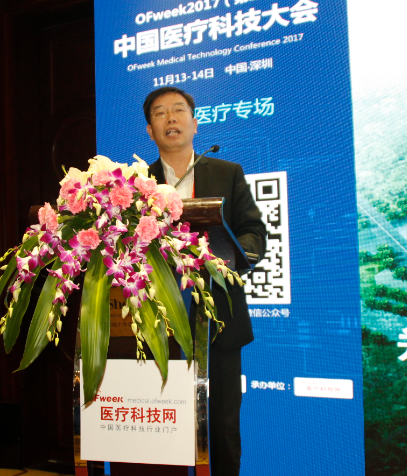
Zhang Yi, director and professor of the First Affiliated Hospital of Zhengzhou University
After the noon break, "the Internet medical special session also followed. Chen Jinxiong, director of the Nanjing Military Region Fuzhou General Hospital, first made an opening speech, and in the speech on "Internet medical rethinking", elaborated on the current development of Internet medical care. Trends and future challenges. In the course of the speech, Professor Chen Jinxiong took the development of shared bicycles as an example, and proposed the future development process of precision medical care such as demand, connection, trust, security, management and control, and anytime and anywhere. Professor Chen Jinxiong believes that the main factor that is questioning the development of Internet medical care is the lack of data, and the future diagnostic-grade smart wearable devices will be a breakthrough point in the development of Internet health care. In the future, with the continuous promulgation of national medical policies, with the medical The continuous integration of data and precision medicine will subvert the traditional medical model, which opens up a more imaginative development space for the medical industry .
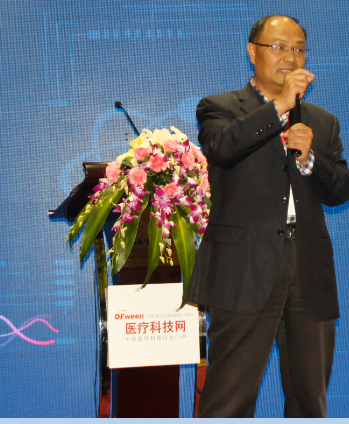
Chen Jinxiong, Director of Fuzhou General Hospital of Nanjing Military Region
“Rehabilitation robots will become an emerging rehabilitation therapy technology†said Cao Qixin, director and professor of Shanghai Jiaotong University, in the keynote speech on “Lower-limb rehabilitation training robot system based on cloud platformâ€. For the development and promotion of lower limb rehabilitation robots, Cao Qixin summarized the following nine technologies: integrated treatment and rehabilitation technology, Internet of Things technology, rehabilitation quantitative technology, cloud + big data + AI technology, new concept technology, intelligent sensing technology, human factors engineering. Technology, intelligent personalized service technology, and rehabilitation effect expert assessment technology. Professor Cao Qixin believes that with the continuous promotion of various domestic policies and the advantages of China's vast market, the number of experimental application data and the number of patent applications for rehabilitation robots in China are increasing, and the domestic and European monopoly rehabilitation robot market is constantly launching an impact. With the continuous breakthrough in technology, China is expected to achieve cornering overtaking in the market of rehabilitation robots in the future.
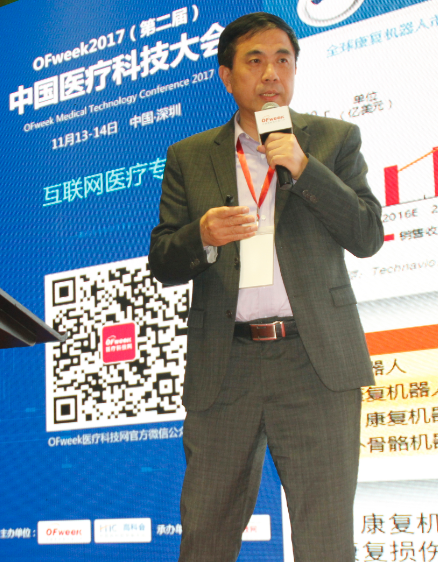
Director of Shanghai Jiaotong University, Professor Cao Qixin
Subsequently, in the keynote speech of “Intelligent Monitoring of Physiological Indicatorsâ€, Zhu Zhenmin, director of the Institute of Computing Technology of the Chinese Academy of Sciences, gave a brief description of the current status of wearable devices and made specific analysis on the application of wearable devices in the medical field. He believes that wearable devices can detect and monitor physical health indicators well by measuring vital signs, measuring blood flow indicators, and measuring blood glucose levels. In the future, we will monitor the physiological indicators of the human body by building a national health data center and health management platform to obtain long-term personal health queue data.
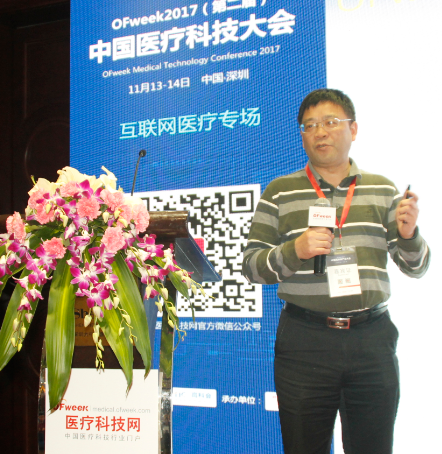
Director of the Institute of Computing, Chinese Academy of Sciences, Professor Zhu Zhenmin
Next, Guan Xin, deputy general manager of Huada Gene Internet Center, in the keynote speech “Gene + Internet, Accurate Health Starts with Meâ€, the four major components of the gene analogy of poker four colors, more vivid description of genetic diversity source. Guan Xin believes that the disease is inseparable from genetic and environmental factors. We should actively promote the gene health Internet platform and work together to promote the development of genes and the Internet through various systems. At the same time, it is hoped that each pair of parents can perform pre-pregnancy tests before pregnancy, and genetic testing can be used to assess and analyze the risk of genetic inheritance, thereby reducing the occurrence of genetic disorders. The results of a series of clinical trials show that genetic testing can significantly reduce or reduce the risk of genetic disorders.
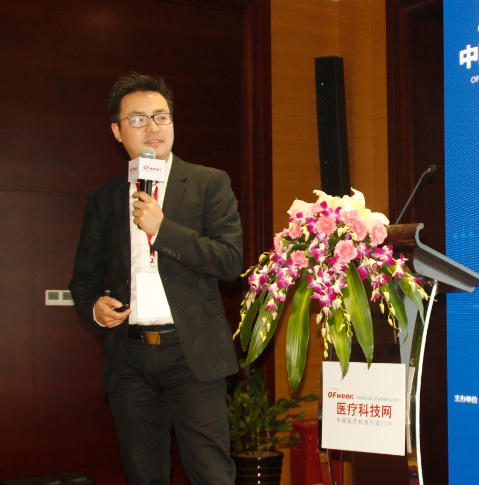
Guan Xin, deputy general manager of Huada Gene Internet Center
Finally, Kelvin Soo, the GM and global technology VP of Shennian Technology Hong Kong, gave a wonderful speech on the theme of “Biosensors Applied in the Field of Health Careâ€. According to Kelvin Soo, biosensors can present physical health data by detecting brain waves and electrocardiograms. Subsequently, Kelvin Soo used LifeBeat and cardiostick products as examples to compare the data collected by the product and introduce the application of biosensors in the medical field.
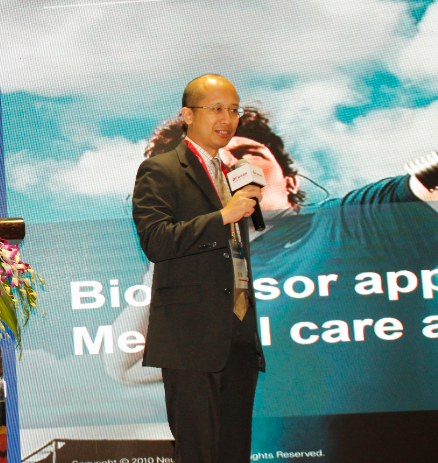
Shennian Technology Hong Kong GM and Global Technology VP Kelvin Soo
After a wonderful keynote speech by the participating experts, the two-day "OFweek 2017 (2nd) China Medical Technology Conference" also officially ended! After the meeting, the audience was still unfinished, and they had face-to-face interactions with the speakers, discussing the problems encountered and the vision of the industry. For more details, please pay attention to the follow-up reports of OFweek Medical Technology Network!
Dental Cleaner,Dental Cleaning Machine,Ultrasonic Dental Cleaner,Best Dental Ultrasonic Cleaner
ZHEJIANG FOMOS MEDICAL TECHNOLOGY CO.,LTD. , https://www.ifomos.com